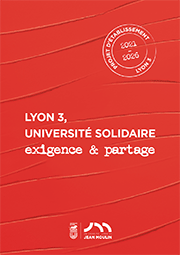AccueilRechercheProgrammes et productions scientifiquesThèsesThèses soutenuesThèses soutenues - 2006-2021Thèses soutenues - 2015
-
Partager cette page
- Recherche,
BENZAQUEN Bélinda
Primauté et recours
Publié le 12 mai 2015 – Mis à jour le 20 décembre 2018
Thèse en Droit mention Droit de l'Union européenne soutenue le 24 avril 2015.
Primauté absolue du droit de l’UE ou suprématie des dispositions constitutionnelles ? Consacrée à l’analyse des conflits nés ou à na?tre entre normes constitutionnelle et celles du droit de l’UE, cette étude doctorale s’est focalisée sur l’analyse du lien entre les termes primauté et recours pour relever que dans ce genre de litiges contentieux un syllogisme juridique inédit est appliqué. Il s’agit de celui qui préserve cumulativement le critère hiérarchique caractérisant les ordres juridiques internes des ?tats membres, à son sommet le principe de suprématie des dispositions constitutionnelles sur toutes les autres et l’application effective de la primauté matérielle du droit de l’Union ; les évolutions récentes du droit interne de l’UE convergent toutes dans ce sens : dans le cadre d’un litige contentieux, la primauté n’est plus une problématique de légalité constitutionnelle, le conflit est contourné. En la matière, les débats sur l’autorité et la force du droit international classique sur le droit constitutionnel ne se pose plus. Il a été séparé entre la force et l’effet des traités du droit international de l’Union. Pourtant sur le plan des principes, même au sein d’un ?tat fédéral, le contenu définitionnel et surtout le maniement du texte constitutionnel n’ont pas été revisités ; la Constitution est le fondement sans être le contenu de validité de la primauté du droit de l’Union, le texte suprême opère en tant que technique de renvoi, il cadre deux types de champs en fonction du critère de l’objet du litige contentieux. Suprématie et primauté sont deux principes de nature juridique différente qui ne s’affrontent pas. La prévalence de la primauté matérielle du droit de l’Union n’affecte nullement la suprématie au sommet de la hiérarchie pyramidale des normes de chacun des ?tats adhérents.
Absolute primacy of Community law or supremacy of constitutional provisions ? Devoted to the analysis of the conflicts born or to be born between EU law and constitutional standards, this doctoral study focused on analysis of the link between the terms of primacy or preemption rule and jurisdictional actions to raise that in this kind of litigation disputes a unreported legal syllogism is applied. It's one that cumulatively preserves the hierarchical criterion characterizing the domestic legal systems of the Member States, at its peak the principle of supremacy of the Constitution over all others and the effective application of the material primacy of Union law ; recent developments in internal law of the Union converge in this sense : in a dispute litigation, primacy is no longer a problem of constitutional legality, the conflict is circumvent. Concerning this matter, the debate on the authority and the force of traditional international law on constitutional law no longer arises. It has been separated between the force and the effect of the treaties of international law of the Union. Yet in terms of principles, even within a federal State, the definitional content and especially the handling of the constitutional text have not been revisited ; the Constitution is the legal basis without being the content validity of the primacy of Union law, the supreme text operates as a reference technique, it fits two types of fields based on the criterion of the contentious issue. Supremacy and rule are two different legal nature principles which do not compete. The prevalence of the material primacy of Union law sets no supremacy at the top of the pyramidal hierarchy of standards of each of the acceding States.
Mots-clés : A. Ross ; champs ; compétences ; constitutionnalité ; contentieux ; conventionnalité ; critère hiérarchique, organique, formel, et matériel ; force et effet des traités ; H. Kelsen ; hiérarchie ; légalité ; office du juge interne ; pluralisme juridique ; préemption fédérale américaine ; primauté du droit de l’UE ; suprématie de la Constitution ; technique de renvoi ; validité.
Keywords : ability, American federal preemption ; A. Ross ; competences ; constitutionality ; conventionality ; criteria hierarchical, organic, formal, and material ; fields ; force and effect of the treaties ; hierarchy ; H. Kelsen ; legality ; legal pluralism ; litigation ; office of internal judge ; primacy of EU law ; supremacy of the Constitution ; technique of reference ; validity.
Directeur de thèse : Thierry DEBARD
Membres du jury :
M. Guy GUILLERMIN, Professeur émérite, Université de Grenoble
M. Michel CLAPIE, Professeur des universités, Université de Montpellier I
M. Eric CARPANO, Professeur des universités, Université Jean Moulin Lyon 3
M. Thierry DEBARD, Professeur des universités, Université Jean Moulin Lyon 3
Président du jury : ?ric CARPANO
Mention : Honorable
Equipe d'accueil : EDIEC
Absolute primacy of Community law or supremacy of constitutional provisions ? Devoted to the analysis of the conflicts born or to be born between EU law and constitutional standards, this doctoral study focused on analysis of the link between the terms of primacy or preemption rule and jurisdictional actions to raise that in this kind of litigation disputes a unreported legal syllogism is applied. It's one that cumulatively preserves the hierarchical criterion characterizing the domestic legal systems of the Member States, at its peak the principle of supremacy of the Constitution over all others and the effective application of the material primacy of Union law ; recent developments in internal law of the Union converge in this sense : in a dispute litigation, primacy is no longer a problem of constitutional legality, the conflict is circumvent. Concerning this matter, the debate on the authority and the force of traditional international law on constitutional law no longer arises. It has been separated between the force and the effect of the treaties of international law of the Union. Yet in terms of principles, even within a federal State, the definitional content and especially the handling of the constitutional text have not been revisited ; the Constitution is the legal basis without being the content validity of the primacy of Union law, the supreme text operates as a reference technique, it fits two types of fields based on the criterion of the contentious issue. Supremacy and rule are two different legal nature principles which do not compete. The prevalence of the material primacy of Union law sets no supremacy at the top of the pyramidal hierarchy of standards of each of the acceding States.
Mots-clés : A. Ross ; champs ; compétences ; constitutionnalité ; contentieux ; conventionnalité ; critère hiérarchique, organique, formel, et matériel ; force et effet des traités ; H. Kelsen ; hiérarchie ; légalité ; office du juge interne ; pluralisme juridique ; préemption fédérale américaine ; primauté du droit de l’UE ; suprématie de la Constitution ; technique de renvoi ; validité.
Keywords : ability, American federal preemption ; A. Ross ; competences ; constitutionality ; conventionality ; criteria hierarchical, organic, formal, and material ; fields ; force and effect of the treaties ; hierarchy ; H. Kelsen ; legality ; legal pluralism ; litigation ; office of internal judge ; primacy of EU law ; supremacy of the Constitution ; technique of reference ; validity.
Directeur de thèse : Thierry DEBARD
Membres du jury :
M. Guy GUILLERMIN, Professeur émérite, Université de Grenoble
M. Michel CLAPIE, Professeur des universités, Université de Montpellier I
M. Eric CARPANO, Professeur des universités, Université Jean Moulin Lyon 3
M. Thierry DEBARD, Professeur des universités, Université Jean Moulin Lyon 3
Président du jury : ?ric CARPANO
Mention : Honorable
Equipe d'accueil : EDIEC
Documentation
Mise à jour : 20 décembre 2018







